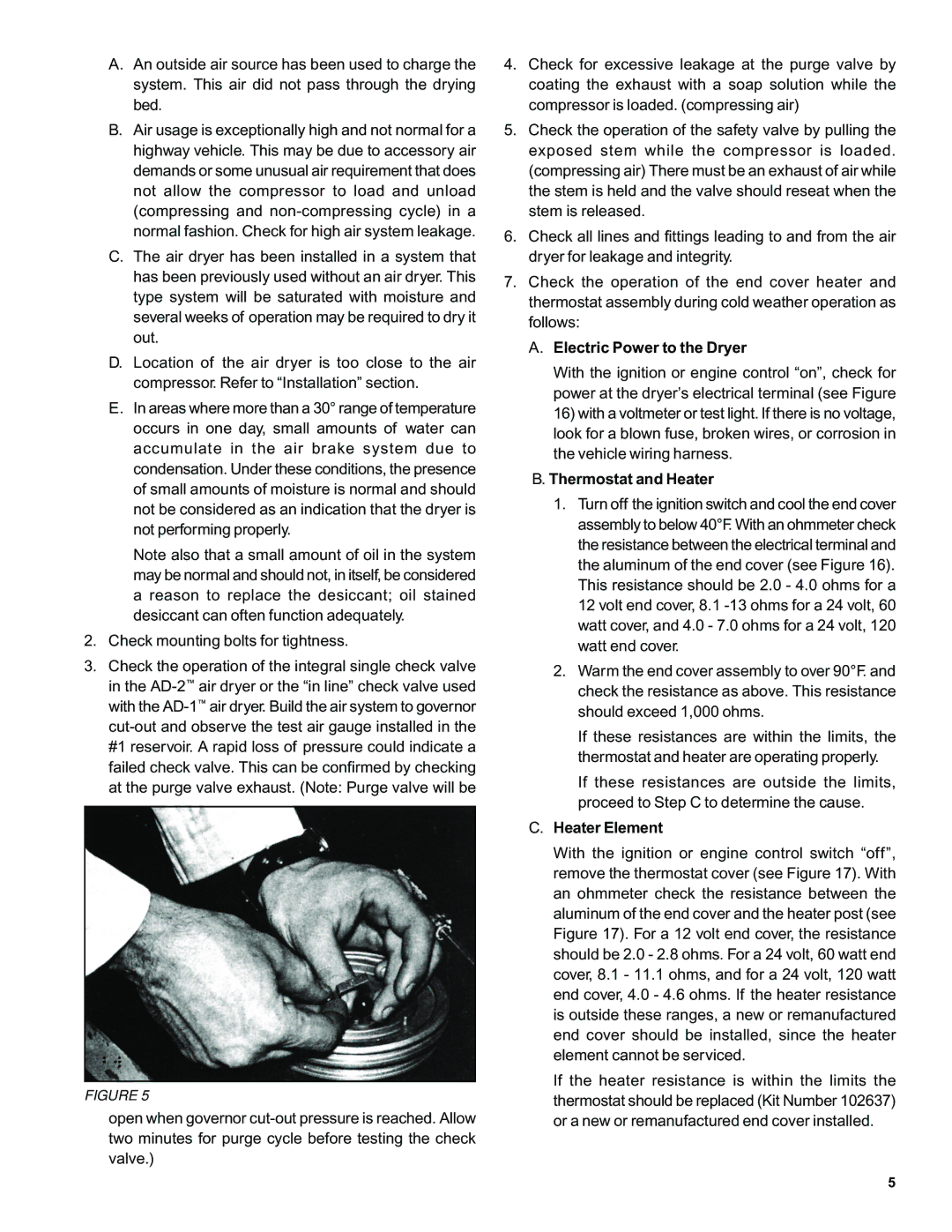
A.An outside air source has been used to charge the system. This air did not pass through the drying bed.
B.Air usage is exceptionally high and not normal for a highway vehicle. This may be due to accessory air demands or some unusual air requirement that does not allow the compressor to load and unload (compressing and
C.The air dryer has been installed in a system that has been previously used without an air dryer. This type system will be saturated with moisture and several weeks of operation may be required to dry it out.
D.Location of the air dryer is too close to the air compressor. Refer to “Installation” section.
E.In areas where more than a 30° range of temperature occurs in one day, small amounts of water can accumulate in the air brake system due to condensation. Under these conditions, the presence of small amounts of moisture is normal and should not be considered as an indication that the dryer is not performing properly.
Note also that a small amount of oil in the system may be normal and should not, in itself, be considered a reason to replace the desiccant; oil stained desiccant can often function adequately.
2.Check mounting bolts for tightness.
3.Check the operation of the integral single check valve in the
FIGURE 5
open when governor
4.Check for excessive leakage at the purge valve by coating the exhaust with a soap solution while the compressor is loaded. (compressing air)
5.Check the operation of the safety valve by pulling the exposed stem while the compressor is loaded. (compressing air) There must be an exhaust of air while the stem is held and the valve should reseat when the stem is released.
6.Check all lines and fittings leading to and from the air dryer for leakage and integrity.
7.Check the operation of the end cover heater and thermostat assembly during cold weather operation as follows:
A.Electric Power to the Dryer
With the ignition or engine control “on”, check for power at the dryer’s electrical terminal (see Figure 16) with a voltmeter or test light. If there is no voltage, look for a blown fuse, broken wires, or corrosion in the vehicle wiring harness.
B. Thermostat and Heater
1.Turn off the ignition switch and cool the end cover assembly to below 40°F. With an ohmmeter check the resistance between the electrical terminal and the aluminum of the end cover (see Figure 16). This resistance should be 2.0 - 4.0 ohms for a 12 volt end cover, 8.1
2.Warm the end cover assembly to over 90°F. and check the resistance as above. This resistance should exceed 1,000 ohms.
If these resistances are within the limits, the thermostat and heater are operating properly.
If these resistances are outside the limits, proceed to Step C to determine the cause.
C.Heater Element
With the ignition or engine control switch “off”, remove the thermostat cover (see Figure 17). With an ohmmeter check the resistance between the aluminum of the end cover and the heater post (see Figure 17). For a 12 volt end cover, the resistance should be 2.0 - 2.8 ohms. For a 24 volt, 60 watt end cover, 8.1 - 11.1 ohms, and for a 24 volt, 120 watt end cover, 4.0 - 4.6 ohms. If the heater resistance is outside these ranges, a new or remanufactured end cover should be installed, since the heater element cannot be serviced.
If the heater resistance is within the limits the thermostat should be replaced (Kit Number 102637) or a new or remanufactured end cover installed.
5
